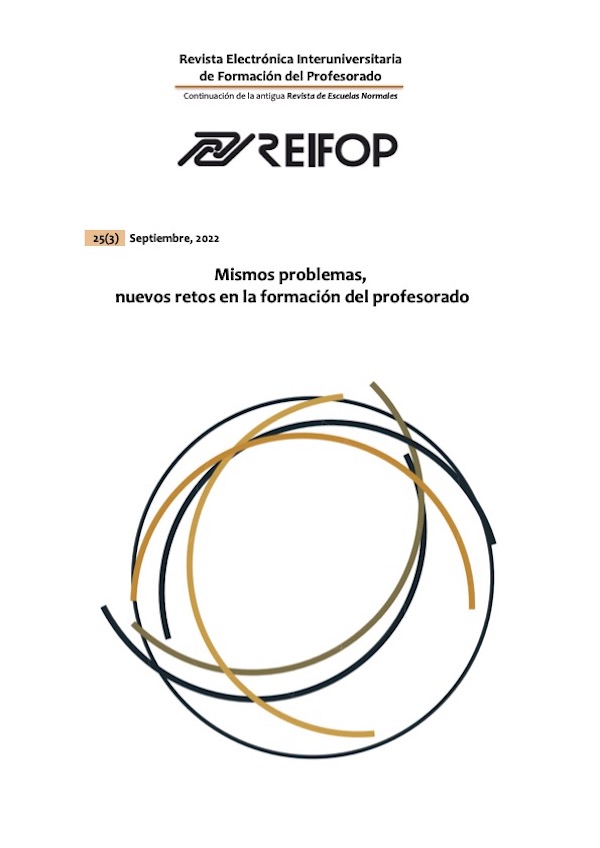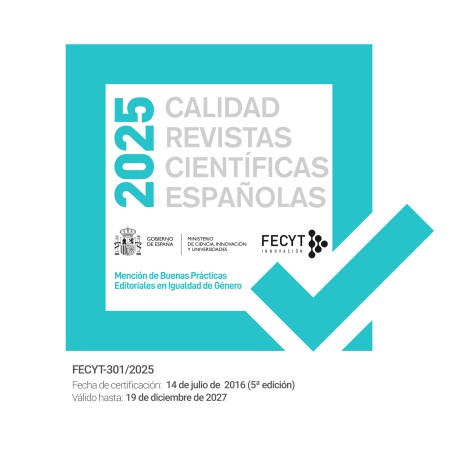Prácticas docentes motivadoras en la enseñanza superior: el caso de los programas de salud y pedagogía
Agencias de apoyo
- Este artículo fue financiado por la Agencia Nacional de Investigación y Desarrollo (ANID) Chile, a través del Proyecto Fondecyt Regular nº 1210626.
Resumen
El presente estudio analiza las prácticas motivacionales reportadas por los académicos de programas de educación y salud. Profesores de ambas áreas de conocimiento (n= 392) respondieron a un cuestionario sobre sus procedimientos habituales para desarrollar la motivación para el aprendizaje en estudiantes universitarios, tanto en contextos de educación presencial como online. Los resultados muestran que más de la mitad de estas prácticas corresponden a estrategias didácticas y no motivacionales. A su vez, los tipos de prácticas motivacionales que prevalecen en ambos grupos son similares (empatía, importancia, amenización). Si bien se destaca la falta de mención de prácticas asociadas a premios y castigos, es notoria la baja mención de prácticas motivacionales relacionadas con la promoción de la autonomía y la autodeterminación, el valor de la utilidad y el clima del aula. También se observa que las prácticas en el formato online se reducen significativamente en los profesores de salud y aumenta en los de educación. Finalmente, tras la discusión de los resultados, se puede concluir la necesidad y el desafío de una mejor formación motivacional en los docentes universitarios tanto en educación como en el área de la salud.
Descargas
-
Resumen1337
-
PDF909
Citas
Boekaerts, M. (2016). El rol crucial de la motivación y de las emociones en el aprendizaje en el aula. In H. Dumont, D. Istance, & F. Benavides (Eds.), La naturaleza del aprendizaje (pp. 83-103). OCDE, OIE-UNESCO, UNICEF LACRO
Cáceres, C., Muñoz , C., & Valenzuela, J. (2021). Responsabilidad personal docente y motivación escolar. REIFOP Revista Electrónica Interuniversitaria de Formación de Profesores, 24(1), 175-188. https://doi.org/10.6018/reifop.402761
Cerezo, R., Fernández, E., Amieiro, N., Valle, A., Rosário, P., & Núñez, J. C. (2019). El papel mediador de la autoeficacia y la utilidad entre el conocimiento y el uso de estrategias de autorregulación del aprendizaje. Revista de psicodidáctica, 24(1), 1-8. https://doi.org/10.1016/j.psicod.2018.08.001
Cook, D. A., & Artino, A. R. (2016). Motivation to learn: an overview of contemporary theories. Medical Education, 50(10), 997-1014. https://doi.org/10.1111/medu.13074
Deci, E. L., & Ryan, R. M. (1999). A Meta-Analytic Review of Experiments Examining the Effects of Extrinsic Rewards on Intrinsic Motivation. Psychological Bulletin, 125(6), 627-668. https://doi.org/10.1037/0033-2909.125.6.627
Di Battista, S., Pivetti, M., Melotti, G., & Berti, C. (2022). Lecturer Competence from the Perspective of Undergraduate Psychology Students: A Qualitative Pilot Study. Education Sciences, 12(2), 139. https://www.mdpi.com/2227-7102/12/2/139
Díaz-Noguera, M. D., Hervás-Gómez, C., De la Calle-Cabrera, A. M., & López-Meneses, E. (2022). Autonomy, Motivation, and Digital Pedagogy Are Key Factors in the Perceptions of Spanish Higher-Education Students toward Online Learning during the COVID-19 Pandemic. International Journal of Environmental Research and Public Health, 19(2). https://doi.org/10.3390/ijerph19020654
Ferreyra, A. C. (2017). Motivación académica: su relación con el estilo motivacional del docente y el compromiso del estudiante hacia el aprendizaje [Tesis de Master, Pontificia Universidad Católica del Perú]. Lima.
Fong, C. J., Dillard, J. B., & Hatcher, M. (2019). Teaching self-efficacy of graduate student instructors: Exploring faculty motivation, perceptions of autonomy support, and undergraduate student engagement. International Journal of Educational Research, 98, 91-105.
Froiland, J. M., & Worrell, F. C. (2016). Intrinsic motivation, learning goals, engagement, and achievement in a diverse high school. Psychology in the Schools, 53(3), 321-336. https://doi.org/ https://doi.org/10.1002/pits.21901
Gill, D., Whitehead, C., & Wondimagegn, D. (2020). Challenges to medical education at a time of physical distancing. Lancet, 396(10244), 77-79. https://doi.org/10.1016/s0140-6736(20)31368-4
Guay, F. (2021). Applying Self-Determination Theory to Education: Regulations Types, Psychological Needs, and Autonomy Supporting Behaviors. Canadian Journal of School Psychology, 37(1), 75-92. https://doi.org/10.1177/08295735211055355
Hangen, E. J., Elliot, A. J., & Jamieson, J. P. (2019). Highlighting the difference between approach and avoidance motivation enhances the predictive validity of performance-avoidance goal reports. Motivation and Emotion, 43(3), 387-399. https://doi.org/10.1007/s11031-018-9744-9
Hattie, J., Hodis, F. A., & Kang, S. H. K. (2020). Theories of motivation: Integration and ways forward. Contemporary Educational Psychology, 61, 101865. https://doi.org/10.1016/j.cedpsych.2020.101865
Leal-Soto, F., Ramírez, J. D., & Valdivia, Y. (2014). Bienestar psicológico y prácticas docentes con efectos motivacionales orientadas al aprendizaje. Universitas Psychologica, 13(3), 15-23. https://tinyurl.com/leal-soto2014
López-Angulo, Y., Cobo-Rendón, R. C., Pérez-Villalobos, M. V., & Díaz-Mujica, A. E. (2021). Apoyo social, autonomía, compromiso académico e intención de abandono en estudiantes universitarios de primer año. Formación universitaria, 14, 139-148. http://www.scielo.cl/scielo.php?script=sci_arttext&pid=S0718-50062021000300139&nrm=iso
Oriol-Granado, X., Mendoza-Lira, M., Covarrubias-Apablaza, C.-G., & Molina-López, V.-M. (2017). Emociones positivas, apoyo a la autonomía y rendimiento de estudiantes universitarios: el papel mediador del compromiso académico y la autoeficacia. Revista de Psicodidáctica, 22(1), 45-53. https://doi.org/https://doi.org/10.1016/S1136-1034(17)30043-6
Oudeyer, P.-Y., Gottlieb, J., & Lopes, M. (2016). Intrinsic motivation, curiosity, and learning: Theory and applications in educational technologies. In Progress in brain research (Vol. 229, pp. 257-284). Elsevier. https://doi.org/ https://doi.org/10.1016/bs.pbr.2016.05.005
Pérez, H. H. (2016). Estilo motivacional del docente, compromiso académico y estrategias de evitación: un enfoque mediacional [Master en Congición, aprendizaje y desarrollo, Pontificia Universidad Católica del Perú]. Lima. http://hdl.handle.net/20.500.12404/7801
Precht, A., Valenzuela, J., Muñoz, C., & Sepúlveda, K. (2016). Familia y motivación escolar: desafíos para la formación inicial docente. Estudios pedagógicos (Valdivia), 42(4), 165-182. https://doi.org/10.4067/S0718-07052016000500010
Putwain, D. W., Nicholson, L. J., Pekrun, R., Becker, S., & Symes, W. (2019). Expectancy of success, attainment value, engagement, and Achievement: A moderated mediation analysis. Learning and instruction, 60, 117-125. https://doi.org/ https://doi.org/10.1016/j.learninstruc.2018.11.005
Reeve, J. (2018). Understanding motivation and emotion. John Wiley & Sons.
Reeve, J., & Cheon, S. H. (2021). Autonomy-supportive teaching: Its malleability, benefits, and potential to improve educational practice. Educational Psychologist, 56(1), 54-77. https://doi.org/10.1080/00461520.2020.1862657
Ryan, R. M., & Deci, E. L. (2017). Self-Determination Theory. Basic Psychological Needs in Motivation, Development, and Wellness. Guilford Press.
Ryan, R. M., & Deci, E. L. (2020). Intrinsic and extrinsic motivation from a self-determination theory perspective: Definitions, theory, practices, and future directions. Contemporary Educational Psychology, 101860. https://doi.org/10.1016/j.cedpsych.2020.101860
Schenke, K., Ruzek, E., Lam, A. C., Karabenick, S. A., & Eccles, J. S. (2018). To the means and beyond: Understanding variation in students’ perceptions of teacher emotional support. Learning and instruction, 55, 13-21. https://doi.org/https://doi.org/10.1016/j.learninstruc.2018.02.003
Trautwein, U., Marsh, H., Nagengast, B., Lüdtke, O., Nagy, G., & Jonkmann, K. (2012). Probing for the multiplicative term in modern expectancy–value theory: A latent interaction modeling study. Journal of Educational psychology, 104(3), 763-777. https://doi.org/10.1037/a0027470
Valenzuela, J., Muñoz, C., & Montoya Levinao, A. (2018). Estrategias motivacionales efectivas en profesores en formación. Educaçao e Pesquisa, 44, e179652. https://doi.org/10.1590/S1678-4634201844179652
Vancouver, J. B., Alicke, M., & Halper, L. R. (2018). Self-Efficacy. In D. Lance Ferris, R. E. Johnson, & C. Sedikides (Eds.), The Self at Work: Fundamental Theory and Research (pp. 15-38). Routledge.
Vansteenkiste, M., Zhou, M., Lens, W., & Soenens, B. (2005). Experiences of autonomy and control among Chinese learners: Vitalizing or immobilizing? Journal of Educational psychology, 97(3), 468.
Vásquez, A., Rojo, R., & Navarro, N. (2021). Conception of the motivating teacher: perception of students’ from a health career. Investigación en Educación Médica, 7(27), 72-81. https://www.medigraphic.com/pdfs/invedumed/iem-2018/iem1827i.pdf
Wigfield, A., & Eccles, J. S. (2000). Expectancy–Value Theory of Achievement Motivation. Contemporary Educational Psychology, 25(1), 68-81. https://doi.org/10.1006/ceps.1999.1015
Wigfield, A., & Eccles, J. S. (2020). 35 years of research on students' subjective task values and motivation: A look back and a look forward. In A. J. Elliot (Ed.), Advances in Motivation Science (Vol. 7, pp. 161-198). Elsevier. https://doi.org/10.1016/bs.adms.2019.05.002
Los artículos que se publican en esta revista están sujetos a los siguientes términos:
1. El Departamento de Métodos de Investigación y Diagnóstico en Educación de la Universidad de Murcia (España), junto con el Servicio de Publicaciones de la Universitdad de Murcia (Editum) son los editores de la revista REIFOP y conserva los derechos patrimoniales (copyright) de los artículos publicados, permitiendo la reutilización de las mismos bajo la licencia de uso indicada en el punto 2.
2. Las obras se publican en la edición electrónica de la revista bajo una licencia Creative Commons Reconocimiento-NoComercial-SinObraDerivada 3.0 España (texto legal). Se pueden copiar, usar, difundir, transmitir y exponer públicamente, siempre que: i) se cite la autoría y la fuente original de su publicación (revista, editores y URL de la obra); ii) no se usen para fines comerciales; iii) se mencione la existencia y especificaciones de esta licencia de uso.
3. Condiciones de auto-archivo. Se permite y se anima a los autores a difundir electrónicamente las versiones pre-print (versión antes de ser evaluada) y/o post-print (versión evaluada y aceptada para su publicación) de sus obras antes de su publicación, ya que favorece su circulación y difusión más temprana y con ello un posible aumento en su citación y alcance entre la comunidad académica. Color RoMEO: verde.
















